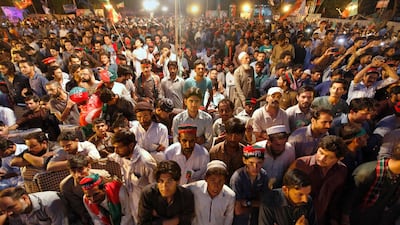Pakistanis will cast their votes on Wednesday in a general election that will determine the sustainability of their young, populous and highly charged parliamentary democracy.
A decade of elected government, the longest in the country's military-dominated political history, has culminated in a deeply divided society, where there is little tolerance for opposing points of view. However, the decision of the 106 million-strong electorate will answer a basic question: how do Pakistanis want their country to be ruled?
In essence, there are two camps. There are those who want radical change and those who want continuity. But these considerations might represent completely different things to the individual voter, reflecting their perception of the two major contenders to become prime minister – former cricket superstar Imran Khan, chairman of the Pakistan Tehreek-i-Insaf (PTI) party, and Shahbaz Sharif, president of the Pakistan Muslim League-Nawaz (PML-N) party and the brother of ex-premier Nawaz Sharif, who was recently imprisoned for corruption.
To many Pakistanis, the rise of Khan heralds the fall of the corrupt dynasties which have prevented the country from fulfilling its potential. This school of thought believes his strength of personality would bring sweeping change to the country's indisputably rotten system of governance.
Others are equally convinced that Khan, in the relentless quest to become prime minister, is in cahoots with the military and judiciary. To such voters, Nawaz Sharif is the victim of a conspiracy to deprive the public of a popular government which delivered on the pledges he made during the last election campaign.
In the aftermath of this election, the biggest challenge facing Pakistan’s next prime minister will be to convince the electorate and the opposing power lobbies to give him sufficient breathing space to stabilise the country. This would come at a heavy price, if at all.
It would require a transformation of the public personas of both Khan and Shahbaz Sharif. Khan would have to set aside populism and embrace statesmanship; Mr Sharif would need to graduate from management to leadership. As they are both in their 60s, it is unlikely either would be able or willing to change their ways.
The next Pakistani prime minister seems destined to assume office without the luxury of a honeymoon period. This would test his ability to take difficult decisions, particularly with regards to the economy.
In terms of GDP growth, Pakistan has grown at a healthy rate of around five per cent over the past three years. A marked improvement in the country's security environment has unleashed consumption while projects worth Dh66 billion under China's Belt and Road Initiative (BRI) have plugged power supply shortfalls and gaps in logistical infrastructure. But exports, remittances and foreign direct investment have lagged, creating an unmanageable current account deficit which, in turn, has drained foreign exchange reserves and sparked a run on the rupee.
Irrespective of whether the new prime minister chooses to immediately seek a bailout from the International Monetary Fund (IMF), the new government would be forced to institute an unpopular budgetary austerity programme.
Khan has more political wriggle room because he can blame Mr Sharif’s PML-N for the situation but that narrative would have a very limited shelf life for a general public with very little disposable income. In practice, neither would have much fiscal space because most of Pakistan’s current expenditure is tied to foreign debt servicing and defence spending, neither of which are open to negotiation.
Both factors are also tied to the country’s foreign policy, control of which is fiercely guarded by the military. Nawaz Sharif, and former president Asif Ali Zardari before him, attempted to wrest control and paid dearly for it.
Mr Sharif would be torn between political survival and his jailed brother’s opposition to the military’s controversial distinction between pro and anti-state militant groups, a key element of its strategy to defeat the Tehreek-i-Taliban Pakistan insurgency.
Already, this has led to Pakistan’s economy being placed on probation by the Financial Action Task Force, a Paris-based multilateral organisation which seeks to curb money laundering by terrorist groups at the behest of the US and its allies.
This would certainly affect any negotiations with the Washington-based IMF, which would also demand disclosure of the terms of the BRI programme – something China doesn't want, particularly amid an ensuing trade war with the US.
Khan, on the other hand, is viewed as soft on militancy and loud on populist nationalism, making him controversial in the West. He also earned the chagrin of China when a prolonged PTI sit-in protest in Islamabad’s government district in 2014 forced Chinese President Xi Jinping to postpone the unveiling of his BRI programme for Pakistan.
This all makes for a daunting challenge for the next prime minister of Pakistan. Khan certainly has the guts and the motivation to take it up. But after serving three terms as chief minister of populous Punjab province, Mr Sharif has the administrative track record and international relationships to perform well.
But neither would be able to assert complete control over the policies that matter most and would find themselves highly dependent on lady luck to survive, much less thrive.
Tom Hussain is a journalist and political analyst in Islamabad
_________________
Read more:

